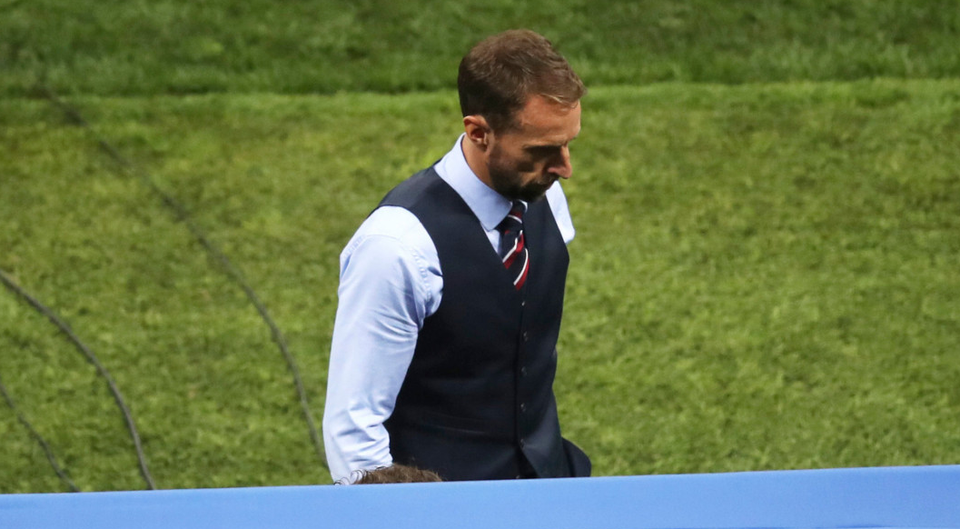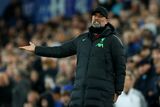Eamonn Sweeney: Why should we support England? We're not English
England dejected after defeat to Croatia
Let's all laugh at England, let's all laugh at England, ha ha ha ha, ha ha ha ha. Yes, I know it's terribly immature of me. I should be ashamed of myself. But everyone has their breaking point and I reached mine last week. Sometimes you've just had enough.
Enough of it's coming home, it's coming home, enough of articles about how Gareth Southgate had singlehandedly solved the problems of basket case Brexit Britain, of guys disingenuously banging on about the triumph of 'diversity' like England were the only team in the World Cup with black players when in fact, as the great music journalist Neil Kulkarni pointed out during the week, "Where England 'fans' gather is not a place for brown-skinned people to be."
Enough of the arrogance which saw Croatia dismissed and the final against France discussed before the semi had been played, enough of the mindless ambulance-destroying IKEA-trashing stupidity of it all, enough of the whining about the ingratitude of their celtic neighbours.
Enough, enough, a hundred times enough of yacht made flesh Simon Coveney crawling up the fundament of Prince Harry to untruthfully inform him that most Irish people hoped England would win the World Cup. And of Ireland's most boring men writing reams about why they'd be supporting Southgate's Union Jack army and chiding those who weren't, apparently under the impression that they were saying something enormously brave and iconoclastic. In reality, this article has been written during every finals in living memory and its self-congratulatory amazement at its own daring makes its authors sound like middle-aged lads trying to impress a barmaid by going, 'Y'know, I think everyone's sexuality is their own business so it is."
Why should we support England? We're not English. Your average English person doesn't think they should 'move on' and 'show maturity' by admiring Germany and making common cause with Scotland. They greet a German defeat with a sneer and scoff at Scottish failure and see no reason why this should not be so. Because it's all banter, innit? I've never met an Englishman who spends his time apologising to the invisible Irishman over his shoulder. I wish I could say the reverse is true but that's the legacy of colonialism I suppose.
Gareth Southgate, in his page boy crossed with a snooker player outfit, seems a decent enough skin. So do most of his players. But that doesn't mean there's much truth in the assertions that they represent a kinder, gentler England. It seems the same old spot to me. When Roy Keane had the temerity to explain where they'd gone wrong in the semi-final, the reaction was familiar. 'I'm sorry but Roy Keane is awful,' tweeted the worst leader the British Labour Party ever had, Ed Miliband. Intellectual powerhouse Ian Wright could only fall back on trying to imitate Keane's accent. Because that's foreigners yeah, they talk funny not like us.
When anyone points out the tendency of English supporters to lapse into this kind of ignorant jingoism, our native apologists tend to mumble, "We're just as bad in our own way." But we're not, are we? Both ambulances and pizzerias survived our victory over Italy in the European Championship unscathed. Didi Hamann is permitted to comment on the shortcomings of the Irish team without someone interjecting, "Vot are you saying? Zis is not right."
Most irritating of all was the constant refrain that Irish people should throw themselves wholeheartedly behind the English cause because, "They were very good about giving Irish people jobs over there." Most of the people who come out with this never actually worked in England, which may explain their lack of knowledge of how the employment market works there. Those jobs were not provided out of charity, English employers were in need of people and Irish people happened to be the best candidates for the jobs they got.
This concept of national gratitude shines a strange light on how our World Cup Anglophiles must regard our own immigrant workforce. When I see a foreigner working here, I don't say, "I hope you're grateful for what we've done for you Andris/Ahmed/Magda." I don't think they have to support our national teams and I surely don't think their relations back home are duty-bound to do so. Maybe that's immature of me.
One of the oddities of England's campaign was that they got premature credit for things they hadn't actually done. Witness the amount of articles contrasting the achievement of Southgate's team with that of previous sides who'd got into major semi-finals but came up short. This team was different because they . . . got into a major semi-final and (let me check my notes) came up short. Instead of a new 1966, it was 1990 and 1996 all over again.
‘Gareth Southgate, in his page boy crossed with a snooker player outfit, seems a decent enough skin. So do most of his players’ Photo: AP
This propensity for ignoring the evidence of their own eyes also led some pundits to insist that Southgate's team were playing a more attractive brand of football than their predecessors. In reality, they bore an odd resemblance to the Greece team which won the 2004 European Championship: determined, well-organised and absolutely brilliant at set-pieces. These are traditional English strengths and the team was eventually undone by traditional English weaknesses.
If England's ability to score from dead ball situations was remarkable, so was their inability to create chances from open play. The dreadful World Cup endured by Raheem Sterling seems an indictment of the manager rather than the player. Chasing hopeful balls and watching others being pinged over his head, it was as though the Manchester City star had been given a glimpse of a dystopian alternative existence, one in which he was condemned to ply his trade with Stoke City or Crystal Palace.
It's not just England's performances which have had a hint of déjà vu about them. There's something of a 1974 feel about today's final. Like Holland back then, Croatia are a traditionally unsuccessful small nation powered by players with impressive club pedigrees who play an attractive brand of attacking football.
France resemble the West German side which proved too strong for the Dutch 44 years ago. They have plenty of outstanding individuals in their ranks but the over-riding impression is of power and pragmatism. In this they mirror their manager Didier Deschamps, a remorselessly efficient anchor man whose playing career was unrelieved by any great evidence of flair or imagination. The 11-minute spell which produced three goals against Argentina showed what France can do if they cut loose, but they've shown little desire to do so since then.
Kylian Mbappe has enjoyed some lovely moments, yet this team is founded on the defensive obduracy of Raphael Varane and Samuel Umtiti and the strength and work-rate of Paul Pogba and Ngolo Kante in midfield. Two years ago, a cautious attitude cost them dear in the European Championship final against Portugal and you would hope that if they play the same way today they come up short again.
Back in 1974, West Germany reached the final with a 1-0 win over another hugely exciting side from an unfashionable country, Poland. This time around Belgium filled the Poland role and their failure to break down France denied us what would probably have been a much more exciting decider than the protracted exercises in tedium which have been our lot of late.
In Belgium's absence, Croatia must be the romantics' choice. Exhilarating in the group stages, they found things trickier after that. Yet they have always tried to play on the front foot and showed great strength of character in coming through on penalties having been denied by the negative Danes and in finally halting the runaway emotional rollercoaster which was the Russian campaign. On Wednesday night, they walked into a heavy punch early on and reeled on the ropes for the next half-hour, just one good shot away from oblivion.
Yet once more they dug deep and outclassed England from then on. In Luka Modric, they have the Player of the Tournament. As the man who makes things tick at Real Madrid, the little schemer's reputation was high enough coming into the tournament, yet in Russia he has shown us an entirely new side of himself. In the final minutes of extra-time against the host nation he closed down a defender, got a half-block on the attempted clearance and then hared out towards the corner flag, retrieving a ball anyone else would have given up for dead inches before it crossed the line. When he gave the ball away late on against England, Modric chased gamely back before putting in a tackle which ended a dangerous break.
Along with this Keanesque work-rate have come the usual array of passes - short, crossfield, long, through, and the astounding goal against Argentina which made people think for the first time that Croatia might be this tournament's dark horses. Modric and Ivan Perisic, Mario Mandzukic and Ivan Rakitic have given us a lot of good football over the years and may not be around in 2022. This is their big shot and I hope they make it today. It would be good for football and good for small countries everywhere trying to punch above their weight and escape the shadows cast by powerful neighbours.
If Croatia don't make it, at least they did us a favour on Wednesday night. Revenge for Skibbereen.
Don’t underestimate the achievement as diverse band of Irish heroines tear up trees on the track
Ireland’s silver medal in the women’s 4 x 100m relay at the World Under 20 athletics championships in Finland yesterday will be one of our finest sporting achievements in 2018. It will also be the most surprising.
In the 32-year history of the championships, Ireland had won two medals prior to yesterday. Few people would have thought that number three would come in not just a sprint but a sprint relay. Sprints have never been an Irish forte, while relays tend to be the preserve of bigger countries with sufficient strength in depth to field four outstanding runners.
Yet in Tampere, Ireland finished second in a national record of 43.90. A team of Louth’s Gina Akpe-Moses and Patience Jumbo-Gula, Carlow’s Molly Scott and Limerick’s Ciara Neville, who stepped in for injured Dubliner Rhasidat Adeleke, achieved a significant milestone in Irish athletics.
It completes an extraordinary week and a bit for Irish athletics, coming as it does hot on the heels of the record-breaking achievement at the European under 18s in Hungary last weekend where a haul of three golds and one silver made it Ireland’s finest ever major championships performance.
Going to those championships in Gyor, Sarah Healy had already enjoyed a phenomenal season. Number one in Europe over 800m, 1,500m and 3,000m, she’d clocked the second fastest time ever by a European over the 1,500. Still, fast times are one thing and major championship racing is another. And the Blackrock AC girl was undergoing the arduous task of trying to win a 1,500m/3,000m double, which involved three races in three days.
Healy didn’t just win the double, she did so in the most spectacular style. On the Friday she won the 3,000m by almost six seconds, clocking a championship record of 9.18.05. Almost unbelievably she did this just seven hours after winning her 1500m semi-final.
The Dubliner was equally dominant in Sunday’s 1500m final where she had almost three and a half seconds to spare. Once more her winning time, 4.18.71, was a championship record.
There’s probably never been an Irish athlete who’s been so good so young as Sarah Healy. She is world number one over 1,500m, ahead of some terrific Kenyans and Ethiopians, and number five over 800m and 3,000m, where she can undoubtedly go a lot faster. You can only be excited to see where she goes from here.
Like Healy, Adeleke is from Dublin but, as the daughter of Nigerian parents, she also represents the immigrant communities who’ve done so much to enrich Irish life in recent years. Unlike Healy, the Tallaght sprinter didn’t start as favourite but showed real championship temperament in producing the race of her young life in the 200m final, winning in a terrific personal best of 23.51. And Adeleke is still just 15.
Adeleke isn’t the only Irish sprinter of Nigerian descent who’s been making waves lately. Last year Akpe-Moses of Dundalk won the European under 20 100m and last week she made the world final. And in Gyor, Jumbo-Gula came fifth in the 100m. “It’s great being half and half because I get to share two amazing cultures,” Adeleke recently told Ireland’s best athletics writer Cathal Dennehy, who has written superbly about how immigrants have improved the standard of the sport here.
“I’m proud to be progressing and known as an Irish athlete, to be giving something back to the country.”
Emigration goes both ways of course and there’s a long tradition of those born elsewhere declaring for Ireland at international level. That’s what’s happened with Australian-born Sophie O’Sullivan, whose silver medal in the 800m completed our medal haul in Hungary. Sophie is the daughter of the great Sonia, and one of the most affecting images from Gyor was of the agonies O’Sullivan senior went through as she watched her daughter bid for a place on the podium. She might be the greatest athlete in Irish history but for that two minutes and six seconds Sonia O’Sullivan was just another parent wishing the best for their kid.
European medals are never easy to win in athletics but the four Ireland picked up placed us seventh on the medals table. Better again, if you just look at the girls’ table we were number one. It’s quite some achievement and one which should boost those keeping athletics going at grassroots level. The world silver brings things up another notch.
There’s not much glamour involved in coaching athletics. The good kids have to work harder than those in almost any other sport and the international competition they face is unbelievably tough. The general public hardly notices the sport until the Olympics comes round and then they unfairly dismiss athletics because of the lack of medals since Sonia’s heyday.
Yet this is a great sport with a tradition which pre-dates even that of the GAA. Whatever happens at senior level to these brilliant teenagers, and I suspect we’ll be hearing much more about them, their achievements over the last ten days deserve to be celebrated in their own right. Long may they run.















